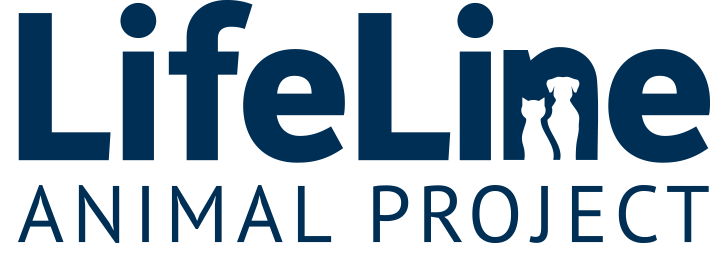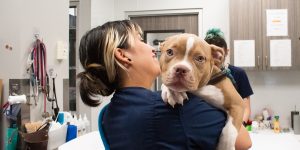Right now, everything is on the table for consideration to save lives and the reasons animals end up in the shelters. These are complicated issues that affect humans as much as it does their pets. Many of the comments we see on social media blame “backyard breeders” or pervasively call for mandatory spay/neuter laws, or both.
We wholeheartedly believe all pets should be spayed or neutered, and LifeLine is the largest spay/neuter provider to the public in the state. We share information, provide affordable and free access, and encourage more of our community to spay and neuter the pets. While we do not have any hard data showing that the cause of our problems today is backyard breeding, we know the animals are coming from somewhere. Our experience in the community, however, has not revealed a cache of backyard breeders. More commonly, we encounter people struggling with accidental litters of puppies or kittens, and it is not a lack of responsibility, but a lack of resources that has caused the problem.
Here are some factors to consider around mandatory spay/neuter legislation or breeding restrictions:
- DeKalb County has an ordinance in place, since 2016, aimed at curtailing breeding and requiring all pets sold in DeKalb County by anyone to have a health certificate from a veterinarian for each pet sold. To our knowledge, no one has ever been cited for violation of this ordinance, and we know of no instance where County officers have ever attempted to enforce this ordinance.
- A recent study presented by Petsmart Charities indicates that over 50% of pets in the United States currently receive only minimal veterinary care or no veterinary care at all.
- The veterinarian shortage is real and ongoing. According to the American Veterinary Medicine Association, in 2019, there were 3,000 more open jobs than veterinarians available to hire.
- With the veterinarian shortage and exponential increases in the cost of veterinary care, available affordable care and high-volume spay/neuter providers are struggling to meet the current demand. LifeLine is the largest provider of these services in the area, and it can take weeks or months to get an appointment at our clinics.
- If law-abiding citizens do not have the resources or access to comply with mandatory spay/neuter laws and, if enforced at all, there are inadequate financial or veterinary care resources for cited offenders to come into compliance, will the solution be to surrender pets to the shelter, thereby increasing the shelter population?
LifeLine occupies a unique position in the Atlanta animal welfare community. As the operator of the county shelters, we necessarily relinquished our position as advocates. We work for the Commissioners, we don’t lobby them. When animal legislation is under consideration, we are frequently asked for advice by our County administrations. We were consulted on the recently passed ordinance in Fulton County prohibiting the sale of pets on public property, and we voiced our support. We encourage everyone interested in legislation directed at limiting breeding to do their homework and contact their local and state elected officials for action.
We are also sensitive to the fact that our field (and these days, our society generally) looks for someone to blame. Some are blaming LifeLine for the current conditions, and while we are not the singular cause of this crisis and cannot control the myriad of external factors, we are responsible and are working hard to improve conditions. Others blame no-kill, but most are looking to the traditional scapegoat in animal welfare: the “irresponsible pet owner.” What we have learned most over our last decade in public service is that people need help. We have developed programs to increase access to care and resources, and we need to learn from the communities most in need what is needed most. Our success is limited, not enhanced, by villainizing or criminalizing people who may need more support. Taken together with a pervasive lack of diversity and inclusivity in our field generally, we fear that a punitive, law enforcement approach will further alienate the people we need most – our community.





